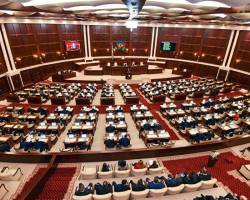The new law “On Public Procurement” was adopted On July 14 2023. For the purposes of this article, we refer to it as Public Procurement Law of Azerbaijan 2024 or simply as "the Law". The newest law of public procurement in Azerbaijan, guided by the principles of efficient and economical use of financial resources, implementation of procurement on the basis of transparency, openness, fairness and competitiveness, came into force on January 1 2024.
The new law “On Public Procurement” was adopted On July 14 2023. For the purposes of this article, we refer to it as Public Procurement Law of Azerbaijan 2024 or simply as "the Law". The newest law of public procurement in Azerbaijan, guided by the principles of efficient and economical use of financial resources, implementation of procurement on the basis of transparency, openness, fairness and competitiveness, came into force on January 1 2024.
The following differences exist between the “old” and “new” Law of Azerbaijan on Public Procurement of the same name:
Scope of the law
The new law does not apply to the procurement of the following goods, works or services:
In the new law, it is noted that procurement at the expense of funds provided by international organizations should be carried out in the manner agreed upon in the agreement, if a separate rule is stipulated in the agreement concluded with these organizations.
Procedure for procurement
One of the main innovations in the law is that, public procurement must be carried out only through the unified internet portal of public procurement. However, procurements involving confidential information and procedures related to these procurements must be carried out on paper.
Change in the volume of the subject of procurement
According to the Public Procurement Law of Azerbaijan 2024, if the procurement contract is specified in a set of conditions in advance by the procurement commission until it is signed by the winning supplier, the volume (amount) of the procurement subject may be reduced-increased by up to 10 percent with the consent of the supervisory authority, provided that the price and characteristics (indicators) of each unit of the procurement subject are not changed, as well as not exceeding the expected price (in the previous law, this amount was 15%).
Framework agreement
A framework agreement is an agreement concluded between the procuring entity and two or more suppliers that meet the requirements, defining the conditions for the procurement of the relevant procurement subject during one budget year, which is required periodically or repeatedly, and at the same time, the volume and total price of which cannot be fully determined in advance.
The framework agreement is concluded in written form and the agreement contains at least the following:
The procuring organization may conclude a framework agreement by applying open tender or request for quotations methods for the purpose of providing periodic or recurring maintenance services to vehicles, machines, machines, equipment, techniques and installations (including the provision of goods that are an integral part of those services) ( in this case, the approval of the supervisory authority is required).
In cases where the procurement will result in the conclusion of a framework agreement, the following are included in the general conditions:
The procurement is carried out in two stages, applying the framework agreement.
In the first stage, the procurement commission conducts procurement by applying open tender or request for quotations methods in the manner established by Azerbaijan's Public Procurement Law 2024 and concludes a framework agreement with suppliers who meet the requirements until 3 (three) working days before the expiration of the validity period of the proposals. A concluded framework agreement is valid for one budget year and does not create an obligation for the procuring organization to place an order.
In the second stage, the procurement commission procures the subject of procurement using one of the following methods as the demand arises:
The procurement commission sends the request for proposals specified in case 2 to all suppliers with whom the framework agreement has been concluded. The deadline for submission of the final proposal in accordance with the request for proposals is determined by the framework agreement.
On the basis of the framework agreement, a protocol is drawn up on the result of each procurement according to the demand and sent to the supervisory authority for information within 1 (one) working day.
In both cases listed above, a simple procurement contract is concluded with the selected supplier for the period specified in the framework agreement. The model form of the framework agreement, the request for proposals and the said procurement contract will be determined by the Ministry of Justice.
Supervisory Authority
State control in the field of procurement in the Republic of Azerbaijan is carried out by the Ministry of Economy of the Republic of Azerbaijan through the Antimonopoly and Consumer Market Control State Service and has the following powers:
The Public Procurement Law of Azerbaijan 2024 also includes the concept of invalid supplier. Thus, suppliers are considered invalid suppliers by reasoned decision of the supervisory authority upon the reasoned application of the procuring entity in the following cases:
When the above-mentioned cases are detected by the supervisory authority, the suppliers are considered invalid suppliers by the reasoned decision of the supervisory authority, they are included in the register of invalid suppliers, and information about this is posted on the portal.
Depending on the severity of the violation and whether the supplier has previously committed such a violation, the period of his stay in the register of invalid suppliers is determined by the supervisory authority. In any case, this period cannot exceed 3 (three) years, and suppliers are not allowed to participate in procurement during that period.
Amount of advance payment
In the previous procurement legislation, the amount of advance payment that the procuring entity could pay to the successful consignor (contractor) for the performance of the procurement contract was limited to 30% of the total cost of the procurement contract. In the new law, this amount is set up to 50% in relation to micro and small business entities.
Recording of meetings
Meetings between the procuring entity and all suppliers who have paid the participation fee are conducted under the control of video surveillance devices. The video recorded by those video surveillance devices is kept by the procuring entity for at least 6 (six) months and is presented within 3 (three) working days based on the application of the supervisory authority. Also, the results of the held meeting are formalized with a protocol. The protocol is sent to all suppliers who have paid the participation fee in order to be considered and posted on the portal on the same day.
Procurement stages
If in the previous law procurement was defined as a simple procedure consisting of 3 stages, in the new Law on Public Procurement a total of 13 procurement stages were defined (the stages existing in the previous law were differentiated).
Right to appeal
In the Public Procurement Law of Azerbaijan 2024, the range of cases in which a complaint cannot be filed has been specified more specifically, and the supplier's right to file a complaint in case of non-delivery of an order by the procuring entity under the framework agreement has not been taken into account as a subject of complaint.
Procurement methods
The new law defines 5 different procurement methods: open tendering, two-stage tendering, closed tendering, request for quotations and single source procurement methods. Unlike the previous law, the new law does not envisage the use of limited participation tenders and request for proposals methods in public procurement.
Request for quotations
According to the new law, the request for quotations is applied when the estimated price is less than 100,000 manats. However, depending on the estimated price, the quotation request method is conducted among the following suppliers and only their offers are evaluated:
Submission of documents and information
In the new law, another provision has been added for more prompt collection of necessary documents and information. Thus, when it is possible to obtain documents or information for participation in public procurements from the relevant government body (institution) through the Electronic Government Information System, those documents or information will not be required from the supplier. In cases where it is not possible to obtain those documents or information through the Electronic Government Information System, their submission will be requested from the relevant state body (institution) with the consent of the supplier, or will be provided by the supplier.
Language of documentation in procurement
In the previous law, it was stipulated that the set of documents for determining qualification suitability, the set of general conditions of the tender, the documents for the involvement of proposals, offers and quotations should be drawn up in the state language of the Republic of Azerbaijan, and if necessary, those documents should be translated into one of the languages widely used in international trade. However, no rules were defined regarding the conflict between the main document and its translation.
According to the Azerbaijan's Public Procurement Law of 2024, in this case, if there is a conflict between procurement documents, priority will be given to documents drawn up in the official language of the Republic of Azerbaijan. Additionally, it is noted that documents (information) by non-resident suppliers may be submitted in that foreign language if provided for in the set of compliance documents and set of conditions.
Formation of the procuring commission
According to the previous law, if the estimated price of the subject of the tender is higher than 5 billion manats, and in the case of organizations financed from the budget, 1.5 billion manats or the equivalent amount in free currency, the tender commission should include their representatives with the power of attorney of the relevant executive authorities. This requirement has been canceled in the new law.
Security reuqirement
According to the new law, the bid security is determined by the procurement commission in the amount of 1-3 percent of the estimated price. In the previous law, this volume was only 1%.
Also, in the old law, performance security was not required in connection with the procurement contract whose price was less than the manat equivalent of 100,000 US dollars during the open tender. In the new law, performance security is not required for procurement contracts with a total amount of less than 30,000 mamats regardless of the procurement method used.
The amount of the performance guarantee was usually set at 2-5 percent of the total amount of the procurement contract in the previous law. In the new law, the volume is defined as 10 percent. In relation to micro and small business subjects, this amount is defined as 5 percent.
Periods
Announcement periods
In the previous law, it was stated that the announcement of holding an open tender must be made at least 30 banking days before the opening of tender envelopes, and at least 20 banking days before the second time, in the state newspapers of the republic and internationally distributed media, as well as on the official website. When the open tendering was conducted through electronic procurement, these periods were defined as 20 banking days and 10 banking days, respectively.
In the new law, this period changes in proportion to the probable price in both open and closed tenders. Estimated price:
In the previous law, the initial period for the announcement of the two-stage tendering was defined as at least 60 banking days, and for the second time at least 40 banking days. According to the new law, the announcement period for the two-stage tendering method (in relation to the proposals of the first stage) is defined as 40 (forty) working days, and at least 20 (twenty) working days for the second stage.
Period of not being a member of the procurement commission
If the procurement commission violates the requirements of the Law “On Public Procurement” and normative legal acts derived from this Law, suppliers can apply to the supervisory authority. If the supervisory authority confirms the violation of normative legal acts during the organization and conduct of the procurement, the results of the procurement are canceled and the procuring entity conducts a new procurement in that case. In this case, the chairman and other members of the procurement commission will be deprived of the right to be the chairman or member of any procurement commission for 5 (five) years, except for the commission members who gave a special opinion different from the adopted decision. Previously, this period was defined as 3 (three) years.
Time period for filing a complaint
Both the previous and the new law established the right of excluded or non-participating suppliers to file a complaint with the procuring organization within 15 (fifteen) business days from the day they knew or should have known that their rights were violated before the procurement agreement entered into force.
While in the previous law, the period for considering a complaint is 20 bank days, and in the case of mandatory participation of micro, small and medium-sized business entities in state procurement, it is defined as 10 bank days, according to the new law, the procuring entity examines the submitted complaint within 10 (ten) working days and makes an appropriate decision and sends it to the complaining supplier within 1 (one) working day from the day of adoption of that decision.
We are delighted to inform that “Effective use of energy resources and state control in the field...
On 26 November 2019, the Law of the Republic of Azerbaijan “On Technical Regulation” (hereinafter...
Significant labor law news in Azerbaijan (2026): Summary and legal explanation of Azerbaijani Lab...




